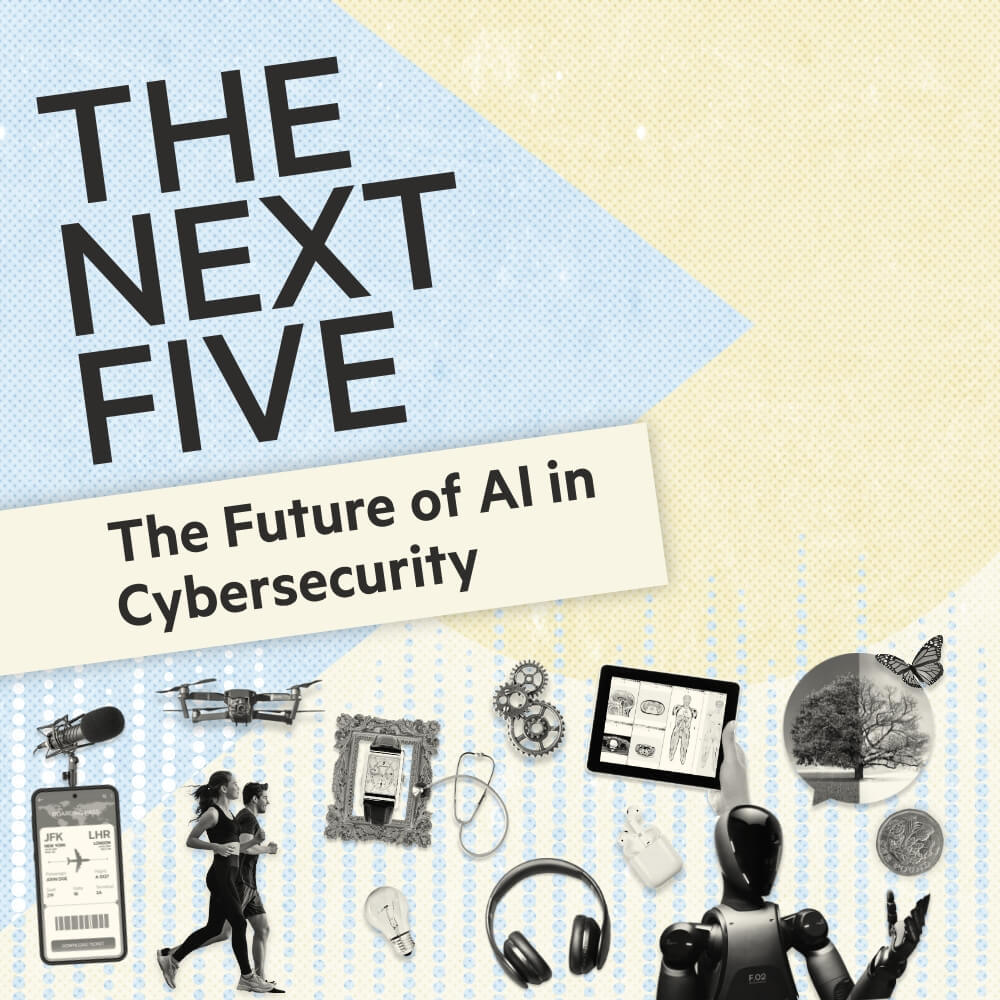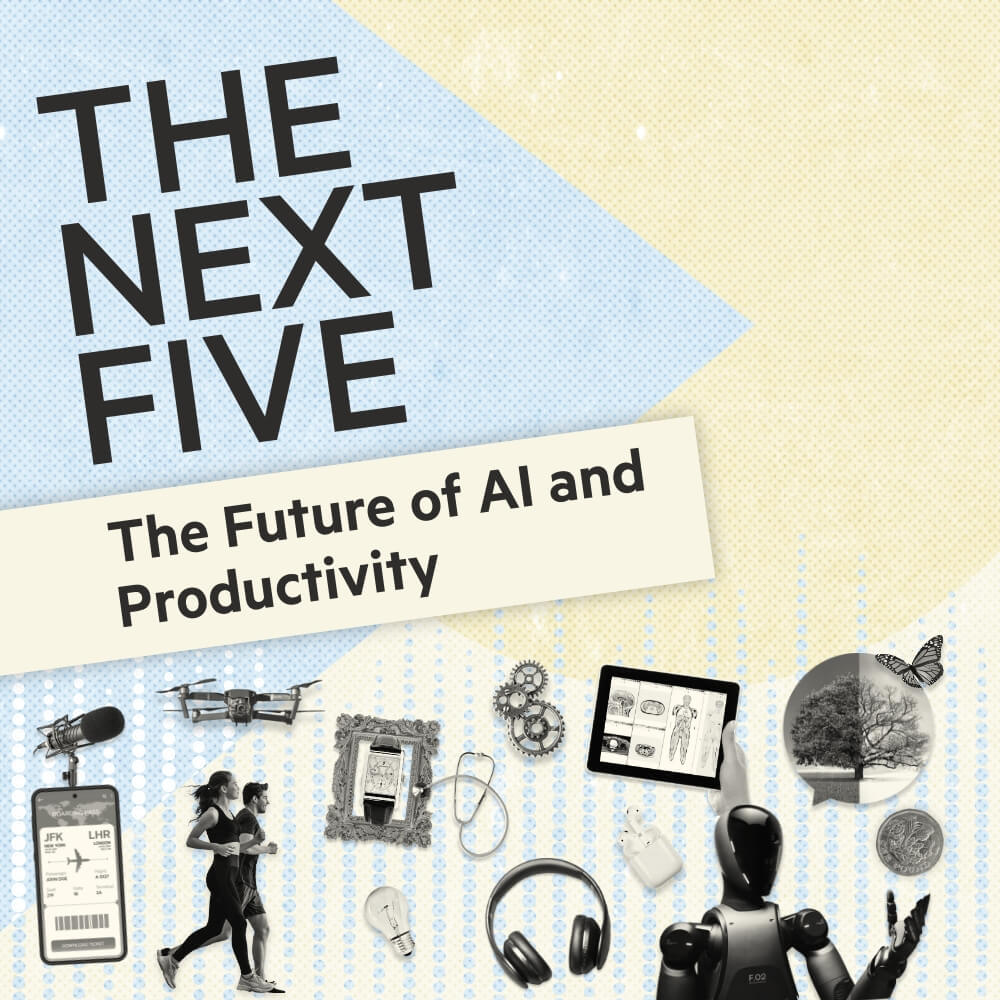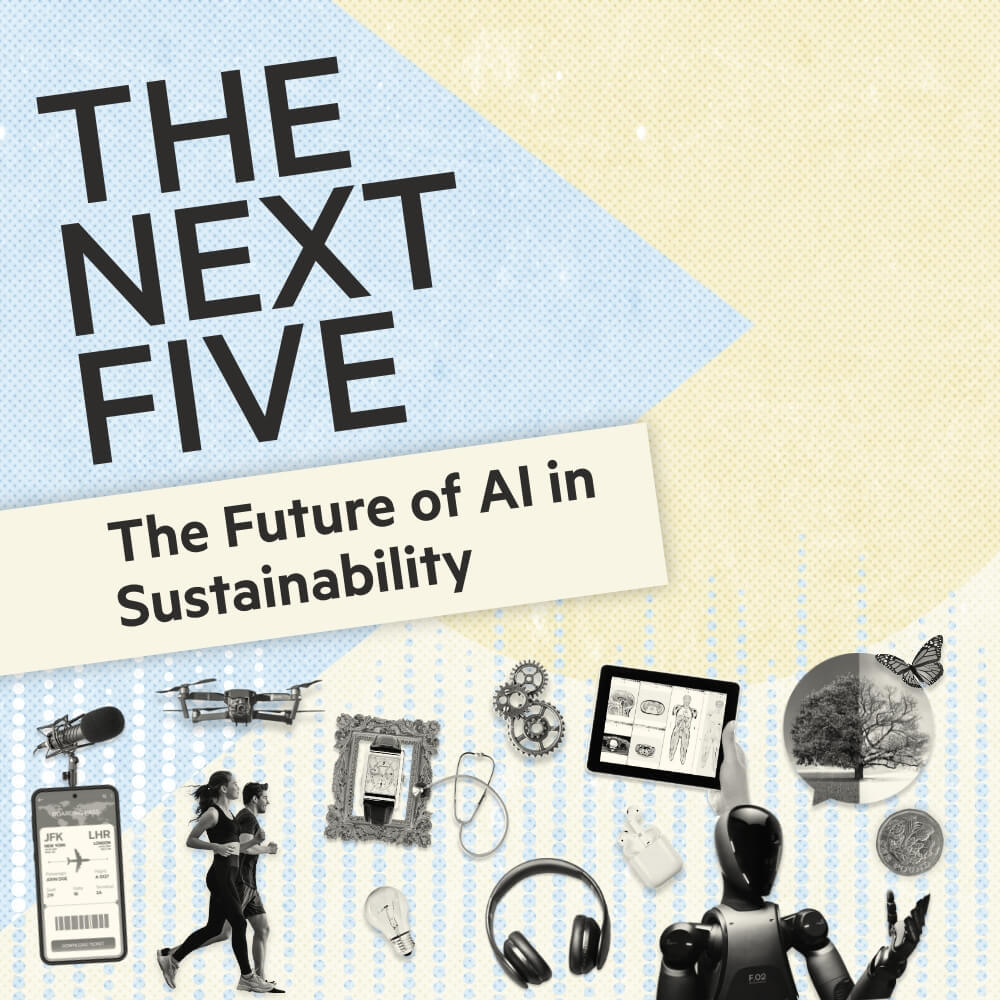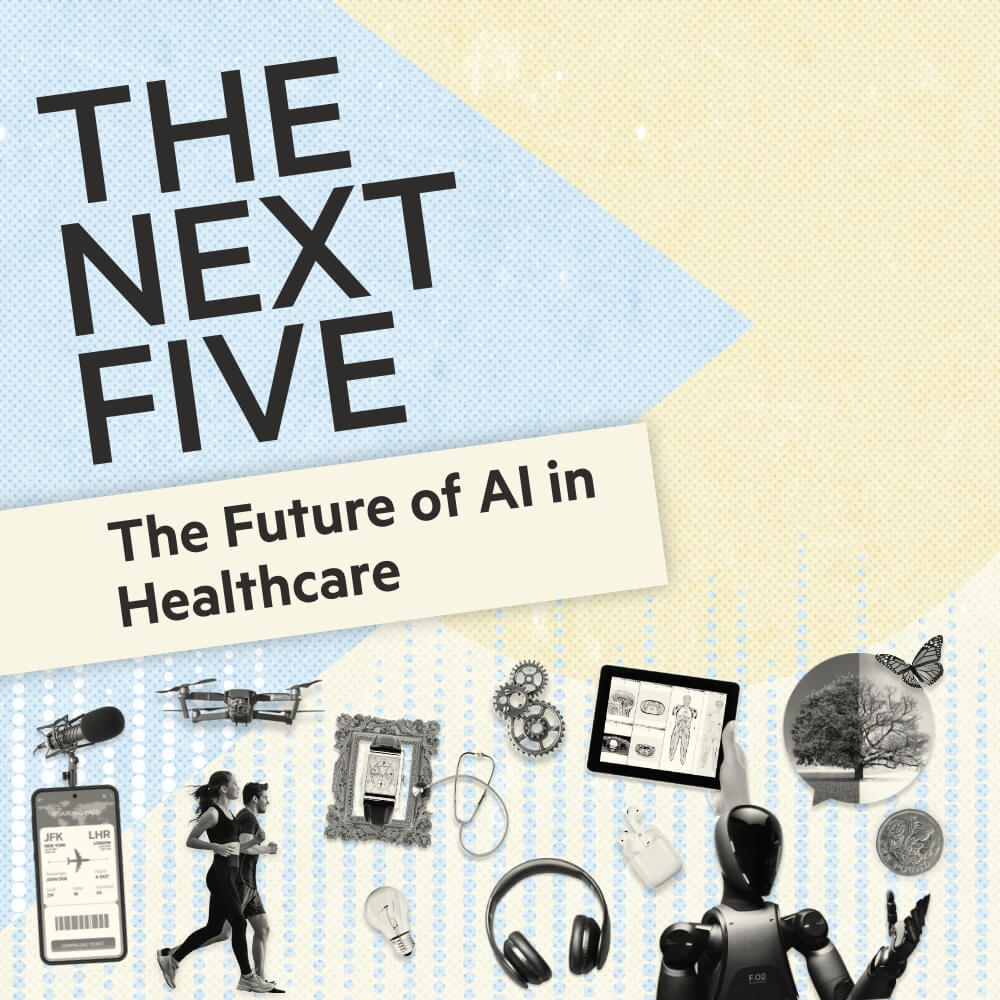THE NEXT FIVE
THE NEXT FIVE - EPISODE 22
The Future of AI and Creativity
How can AI amplify human creativity?






































The Next Five is the FT’s partner-supported podcast, exploring the future of industries through expert insights and thought-provoking discussions with host, Tom Parker. Each episode brings together leading voices to analyse the trends, innovations, challenges and opportunities shaping the next five years in business, geo politics, technology, health and lifestyle.



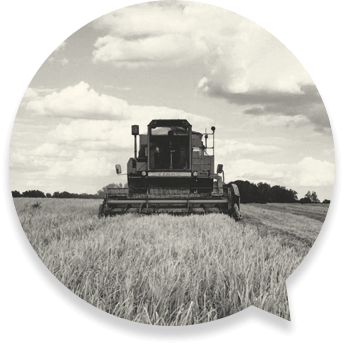







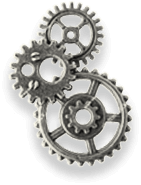




Featured in this episode:
Tom Parker
Executive Producer & Presenter
Doug Eck
Senior Research Director at the Google DeepMind
Dani Verdari,
Youtube content creator
Neil Maiden
Professor of Digital Creativity at the Bayes Business School, City University of London and Director of the Center for Creativity Enabled by AI
Individual creativity and idea construction sets us apart within our own societies, it is a deeply desirable trait, and can give you power and wealth. ‘Gosh, what a great idea!’, ‘Why didn’t I think of that?’ are often thought and heard.
Cue Artificial intelligence, AI can enhance and enable our creativity- giving thousands of creative solutions to our input ideas. Less a brainstorm and more a cosmic tsunami of creation, all in a matter of seconds. It does this without its own personal agenda and selfish desire to have the idea that brings with it the potential for expression, power and wealth. But is it creative? Or, like in many industry applications, is AI a tool that makes us more creative.
In this episode of The Next Five, we hear from Doug Eck, Senior Research Director at the Google DeepMind working on generative media, who discusses how we amplify our own human ideas with technology and that AI brings an inflection point where new art forms could develop with its help. Youtube content creator Dani Verdari, discusses the use of AI in her own content creation, the benefits of having this technology at her fingertips and how it can help others become artists and creators. She also discusses some of the issues around copyright of works that arise. Neil Maiden, Professor of Digital Creativity at the Bayes Business School, City University of London and Director of the Center for Creativity Enabled by AI, looks at how we embed creative thinking in professional practices and how AI can be used to solve problems more effectively.
Sources: FT Resources, Harvard Business Review, Goldman Sachs, American Museum of Natural History, Science Daily, Lesley University, Forbes, Accenture.
READ TRANSCRIPT
- Tech
Transcript
The Future of AI and Creativity
Soundbites:
TOM: Creativity is a very human quality.
Doug Eck: creativity is part and parcel of humanity.
Dani Verdari: I believe that every person is an artist in some way.
But AI is also making its mark on the creative world
GUEST Dani Verdari (06:50.386) AI can give us humans new ideas.
TOM: and creating opportunities for organisations
GUEST Neil Maiden smaller businesses could really benefit from this little sort of creative nudge that AI can offer
TOM
I'm Tom Parker, and welcome to the next five podcast brought to you by the FT partner studio. In this series, we ask industry experts about how their world will change in the next five years, and the impact it will have on our day to day. We’re continuing our special 5 part mini series where we take a deep dive into the world of AI. Each episode is focusing on an industry sector where AI is having and is set to have a big impact.
This final episode in the series is all about AI and creativity, delving into the role AI plays alongside creators, inside businesses and the risks associated with copyright created works in a digital led future.
MUSIC FADE AND BREATHE
TOM:In 2021 scientists discovered the genes they believe distinguish us from apes and our evolutionary predecessors, neanderthals. They are, as coined, the ‘creative genes’. 267 of these creative genes, found only in modern humans, allowed us to possess among other things, creative self awareness and innovativeness, that helped forge our emergence as the dominant species. Today, individual creativity and idea construction sets us apart within our own societies, it is a deeply desirable trait, and can give you power and wealth. ‘Gosh, what a great idea!’, ‘Why didn’t I think of that?’ are often thought and heard.
Cue Artificial intelligence.
AI can enhance and enable our creativity- giving thousands of creative solutions to our input ideas. Less a brainstorm and more a cosmic Tsunami of creation- all in a matter of seconds.
Dani Verdari:
AI can give us humans new ideas. AI makes things easier.
TOM: This is Dani Verdari, a Youtube creator who uses AI to create her content. She has 17 hundred videos and has amassed over 2 million subscribers to her channel.
This allows us to have more time for creative activities and to focus on more challenging tasks. 02:38 AI tools can help be more creative by giving us new ways to make cool stuff.
I love experimenting with AI. The reason is I'm curious how I can combine my creativity with AI. So I feel like AI helps me find new ways to develop my artistic vision.
For example, Mid Journey, I like using it to get more inspiration. Also, ChatGBT. Sometimes when I have no ideas, I ask ChatGBT.
One thing I really like using is video optimization. It includes automatic color correction, image stabilization, and noise reduction. Adobe Premiere Pro does this pretty well, 03:20 so but the new YouTube app also offers great features like noise reduction or cutting videos to the beat. That's really awesome. 03:28 Another tool I enjoy using is dubbing. Since my English isn't fluent yet, I automatically translate my videos. It's amazing how good the tool can translate. Unfortunately, my voice isn't 100 % similar, but I'm curious to see how the two will develop further. And yeah, I'm currently working on my first long format video. I'm focusing on storyboarding and I don't even have to draw anymore because AI helps me. I like to use storyboarder .ai. I write my story and this tool suggests camera movements that I can change manually and in the end my text is turned into images. It's really awesome. Then I have a picture book in front of me. Once I've finished creating it, I discuss with my team which scenes I need. The good thing is here that I can show my team the images how I want them. I let Mid Journey create the backgrounds and in the past it would have taken a long time to find a great, the right background.
TOM: With AI as this loyal team member that can give you ideas and execution at speed it has opened up doors for individuals to become creative in areas that would have taken years to master.
Dani Verdari
First of all, I believe that every person is an artist in some way. So we are all creators in some form. Recently I discovered a YouTube channel where a chemist makes YouTube videos. He has almost one million followers already. So I was very surprised by how well he made the videos.
They were not boring at all. And what I want to say is the individual must believe that they are an artist themselves. So I think it's a mindset topic. They must allow that artists' hearts to emerge. AI will only assist us in this. I do think that people will probably discover their artistic side through AI. So this is because people are curious and will engage more with it. So I mean the barrier to create something will be lower. And I can remember that in the past you might have...had to practice or study for years for something and the barrier was much higher. Perhaps you also didn't want to invest so much time for those skills,
Dani Verdari
So AI helps us be creative by showing us new things, what we can do, but our creativity is still special because it comes from our own experiences and feelings.
TOM
According to Albert Einstein, "Creativity is seeing what others see and thinking what no one else ever thought." AI can see what we all see and offer up new ideas. But is it creative? Or, like in many industry applications, is AI a tool that makes us more creative.
MOVED FROM 07:30 I don't believe that the AI itself is being creative. It's not that it's that maybe it provides us with different ways to look at the world we live in
TOM: This is Doug Eck, Senior Research Director at the Google DeepMind team working on generative media, which includes images, video, 3D, music and audio.
So we've been doing this for millennia, right? Even pencils are technology of some sort. Certainly microphones that we're talking into right now and other technologies to make your podcast, So now we're talking about AI, which is trained on the data from our world and hopefully learn some new connections that we can't see obviously. pulls together some ideas that we can't obviously find, give us ways to reflect on those ideas, bounce off of them, and maybe come up with different ways to communicate our own ideas to people.
I think of it as a mirror, but kind of a funhouse mirror that warps things a little bit for us.
Doug Eck
In some ways, we're all walking around with blinders on, and that's okay, right? Like I live in my own world. Right now, I'm in Mountain View, California. You're somewhere else. We're seeing different things. We're experiencing different things. And what I see is AI is this larger lens. I do a lot of work with music and getting to listen to an AI model that can generate music. I've often talked about it as like this weird radio that's tuned to the entire universe of music. And I can turn the dial and I can hear different forms of music, different styles mashed together in ways that I would have never thought of. I find that both very exciting and very useful for solving creative problems. I think of myself as a creative person. So I'm proud enough of myself to say I don't really need AI to be creative.
But wow, it sure is helpful to take a few lyrics I've written and ask AI for some new ideas. I'm still the editor, I'm still the creator, but I can see things taken in directions that I couldn't by myself predict or write down.
TOM: If you’re an artist, creativity is a million different emotions, feelings, ideas and execution. If you're a technologist, perhaps it’s much simpler. Steve Jobs defined creativity as ‘just connecting things.’
Neil (25:53.015)
Yeah, I mean, given that definition, yes, a machine can generate outcomes that are novel and useful compared to a set that are generated with people. So I would argue that machines can be.
MOVED FROM 10:41 This is Neil Maiden, Professor of Digital Creativity at the Bays Business School at City University of London. He is the Director of the Center for Creativity Enabled by AI, a project funded by Research England looking at how we embed creative thinking in professional practices to solve problems more effectively.
Do I see that as a threat to humanity? Is this an existential threat to who we are? I don't think so. There are still some creative activities that I think are well beyond AI at the moment. Now, who knows in the future, but I would say humor.
Technology, I shouldn't say we, technology's not very good at humor. It's not particularly good at subtext. It's still really about interpreting things literally. Improvisation, I don't think it's particularly effective at that, so there are many areas of what we might characterize as creative human activity that are currently well beyond AI. And ultimately, I think it's about procreation. If you take it back into a business context, it's really about co-creation. There are some creative problem-solving activities that humans are better at still, and there are some problem-solving activities that machines are better at. It's really about dot-tailing these different sets of activities together, so that the machine supports the human, the human supports the machine, and then together you're able to solve problems more creatively, more productively, and more effectively.
TOM: It’s exactly that relationship between human and machine that is important. It is co creation. We still need the human element.
Doug Eck (04:05.982)
I think we need human input there at many, many levels. So I do not think that AI is capable of creating its own creative works. First, initially it's trained on all of the data from our world, right? And second, I wouldn't write this off as a philosophical impossibility, but I think that the creation of art is an artist communicating something to their audience.
And that's nested in our culture, that's nested in our day-to-day lives, it's nested in politics and love and sex and hope and dreams, to complete the Rolling Stones quote.
Doug Eck (05:55.394)
I mean, there's another version of creativity, which is that it, you know, fast changes, like in some ways earthquakes are creative, but not in a way that we like very much, right? Random number generators are creating something new. The fact that you're making something new happen that didn't happen before, for me is not enough to be creative nor is just connecting things, you know, SQL databases connect things. I don't think that they're very creative.
But yeah, I think that creativity is part and parcel of humanity. I think you can extend creativity pretty naturally into scientific exploration, creativity, creation of new technologies, the creative act of making children. I think our whole world is trying to generate more and more of the things we like. We see the failure modes of that too with over consumption and over creation. So sure, there's a whole envelope of creativity that if you keep expanding the definition of it, it is basically all of humanity.
TOM: Creativity is certainly not just limited to the realm of art and media, there is a whole envelope. Entrepreneurialism is based on the notion of starting new businesses based on seeing new ways to make money. Creating the startup that turns unicorn is the underdog story every budding business owner or investor wants to be a part of. But creativity in business is more than just the idea.
10:36 I often call creativity the other C word that can't be mentioned in business.
I think it's been seen to be owned by the creative industries for too long and therefore doesn't have a part in businesses that are not operating in the creative industries. So I think this partly sort of an issue of understanding the words. Creative thinking is part of problem solving. It's not just about creating an artifact with certain aesthetic values. But also most of us have not been trained or educated in creative thinking. It's something that is not part of most of our school and university curricula. Studies have shown that people going through the British education system become less creative the further they go through the system. So we simply don't have the skill sets, the understanding of where creativity can be used in everyday problem solving.
Neil
One of the things that struck me in working with my colleagues at Bayes, is how little teaching and how little space there seems to be for deliberate creative thinking about business models and strategies.
The orthodoxy when it comes to a business trying to understand what its business model might be, it's essentially to pick one off the shelf. There's these little types of business models and you've tried to work out what is the most likely model or models for your business and then you kind of work within the frame of that.
However, we think there's a considerable amount of scope for creative thinking about your business model and models and creative thinking about how you might transition from one business model to the other because this is a form of problem solving. I think it's actually the smaller businesses that could really benefit from this little sort of creative nudge that AI can offer. It's low cost, you don't need to bring in an expensive consultant.
So technologies that try to deploy AI to encourage more creative thinking and innovation around business models and strategies, I think is something that the UK needs. That's why we're working on it.
TOM: Creativity is a core part of business, and can be a competitive advantage, especially in a modern fast paced world. AI can help businesses come up with a multitude of different product ideas, freeing up time, increasing productivity affording humans the ability to creatively think, problem solve and choose from more options than they may have been able to fathom on their own.
Neil (16:59.051)
I make a strong argument that creative thinking in your business is likely to increase your competitiveness and your productivity. And it's interesting that in many organizations, people tend to see a continuum with more creativity at one end and more productivity at the other. And this is sort of a fundamental trade off. Either you're being more productive or you're being more creative. And in the studies that we've ran in manufacturing,
lines and other forms of business, if you introduce AI that's able to generate ideas quite quickly that then people can work with, you actually find the sweet spot between creativity and productivity. So you can actually be more creative, more productively than you were before with AI.
Neil (24:54.171)
that's really where I think business can start to utilize AI in a much more effective way. Very rarely do big ideas suddenly appear. There isn't suddenly that light bulb moment. Big ideas often emerge slowly from the aggregation of smaller ideas until you can generate the big idea. So this idea of little seed creativity, everyday creativity is really what can often lead to the big creativity.
TOM: But there are still challenges to overcome with AI and creativity. When AI generates works of art from existing art forms, copyright issues arise and questions around where do permissions, copyright and IP exist in the new creative AI world?
Neil (21:17.267)
I think there's a lot of coverage, certainly in the arts community, that the copyright has not been managed fairly, it's all been hoovered up by these large language models and I have a lot of sympathy with artists in that area. if you look at the US Copyright Office, their current status I think is that you cannot copyright AI-created content. You can only copyright content created by humans, but of course if it's co-created, what is the boundary there? You could make arguments that a piece of some output is generated with an AI technology, well, it could be, you know, some of the ownership could reside with the owners of the source material that fed the algorithms. It could be partly owned by the developers of the AI software. It could be part owned by the provider of the AI service that operated the software and it could be part owned by the individual who fed the prompt into the AI. I think there's a whole raft of open-ended issues that we haven't really sorted out. I think at the moment what you're seeing is sort of local contracts between customers and providers trying to work at who would own ideas generated by technology.
Neil (20:02.675)
And we're seeing in the creative professions, for example, in designers, that they're not fully adopting generative AI in their work, because there's fears over the authenticity of the outcomes that are generated. Is it authentic to them? A new idea that is generated is often an extension of ourselves that we take some of ourselves into. We've got ownership in this idea and suddenly decoupling this ownership of the idea that I've generated and delegating the machine has issues about how people work with it.
17:02 TOM: This is clearly an area that needs to be cleared up quickly, especially if it’s preventing the creative use of AI and not offering enough rights to those who do create new digital content.
Dani Verdari 14:51
Overall, I don't feel...particularly protected, but that was the case even before the topic of AI. With the topic of AI, everything just happens faster than before.
Dani Verdari (15:18.738)
I mean, as a creator, it's hard to say because before AI, a lot of people used my content to monetize their channel. So on Facebook, they are different channels from me and there are some people who use my content and upload it again. So every day I see the reach, the reach is incredible. So over one million. And I don't know, I think they already monetize with that. So the question is how can I be protective in that way?
Dani Verdari (17:19.634)
I think it will be really helpful when there is an AI tool who analyses my artwork, who copied the artwork and used this content from me. But I didn't find any AI tools where I can check this.
TOM: The question remains what can tech companies do to mitigate the risk and help protect content creators or allow them to monetise when someone does use their work?
Doug Eck (16:23.79)
Let's be real, AI is something we need to adapt to legally and figure out. And until we figure that out, my operating mode is to try to be ethical to just think through how this technology is affecting people who are trying to earn a living? And are we doing the right thing, are we doing the wrong thing? And I think as long as that's front and center, we can make smart decisions. But there's a second area which is just as important and it's business. What would it look like to create a marketplace that is fair to creators of all sorts? That means like the people that created the original data, the people that want to do something with that data, et cetera. Well, it could be quite simple. It could be as simple as.
I'm a visual artist. I'm a photographer. My son's a photographer. But I mean, he's not a professional photographer. He takes a lot of photos. So he's got maybe 1,000 photos. What if there were a marketplace where he could take his 1,000 photos, dump them in a folder somewhere, and then the marketplace would allow someone to generate an AI version of his style and pay him $3? That's it. It gets watermarked, meaning that
we would be able to detect the generated photo as being generated by AI so we don't train on it later. Would also allow some tracking of provenance. But really what happened is someone paid my son three bucks for a photo. He made whatever, $2.50. Store's gonna make something too. Now that at scale, that very simple idea at scale could work. And as my son gets better and becomes more famous, maybe as a photographer and his brand is worth more, he gets to charge more for his photos and more people buy his photos, right? this is a little bit like what YouTube did for its creator marketplace. It's not a perfect marketplace, but fundamentally, you as a creator can go on the YouTube creator marketplace. You can brand yourself, you can try to build an audience, you can make money.
And I think if we do that for AI generated materials long term, we could end up in a place where we're serving creators rights because we're paying people for their source material in a way that's linked to the money that's being made on it.
20:08 GIVE A SLIGHT BREATHE HERE
TOM: And with the pace of change in the industry the balance between the pros and cons is important. It certainly means that the next five years is much more than just ‘watch this space.’ Especially for creators.
Dani Verdari (23:21.362)
I really hope that there will be more automation in my field, more templates and more drag and drop functions. I'm pretty open to the world of AI, so I'm only scared to a certain extent.
Of course, there are downsides and I hope that the creators of these AI tools address them. Especially when it comes to text to video promotion. We know how dangerous deepfakes can be and the damage can cause or have already caused.
Here I see a really big problem with the technology advancing so quickly. So we know that speed always brings a bigger security risk than if something develops more slowly. So I'm also worried about voice changes. There are AI tools that can mimic other voices. And yeah, there are always reports about this.
So yes, and still I'm very curious to see how the tools will develop and how the economy will evolve with them. So how people will deal with it and what new opportunities AI will offer us.
TOM: The speed of advancement and adoption is a key focus for businesses over the next five years.
So I think at the cutting edge of AI, we will see quite rapid increases in the capabilities of technologies that are going to evolve. OpenAI and Google will be offering up new prototype technologies that will really be surprising to us when we first see them and experiment with them. So I think the cutting edge will continue to increase surprisingly quickly. However, if you look in many organizations, business organizations that have got large numbers of legacy systems, you know, long time IT strategies, five year strategies for evolving their products, I think the formal uptake of these technologies is going to be much, much slower.
If we're really going to then think about how we use AI in creative thinking, we know that AI can already support the creative thinking process. Technology isn't the barrier here. It's ultimately the climate within the organizations, the mindsets of people. So whilst the cutting edge may increase, this slower uptake within the organization gives us an opportunity, I think, to...
refocus the need to bring human creative thinking skills up to the level that we can exploit technologies in the next three to five years. And I would like to see more organisations recognizing their human capital as an important creative thinking resource that needs to be developed if it's going to keep up with the technologies.
Neil (30:17.359)
I'm an optimist. I think AI creates a lot of opportunities. I think it's a great leveller as well. It can bring smaller organisations quickly up to the level of bigger organisations and it can be a great leveller within society as well.
SLIGHT MORE BREATHE
TOM: Indeed there is still much optimism in the years ahead if we tackle the risks.
Doug Eck (22:10.782)
Where is AI and art going in the next five years?
Doug Eck 24:20 What I'm seeing is that artists have had a couple years to absorb this technology, to come up with some ideas and to push. That makes me think that we're on an inflection point for seeing some really amazing new art forms develop.
Doug Eck (24:36.119)
around these technologies that will then shape the technologies. So the technologies will try to adapt to the artist. I'll put my money on art looking very, very different and being just amazingly fun. Ideally, an explosion of art in the next five years that feels like the explosion of music that we saw with the British invasion at the end of the 1960s and in the 1970s where we just saw this amazing outpouring of creativity that had to do with lots of things cultural, but also some things technological, like the amplified music, the electric guitar, et cetera. So I'm bullish. I'm betting on a very fun five-year future for AI and art.
Doug Eck (40:52.274)
I would add, in the context of this conversation about where AI is going, let's not ignore short-term risk.
Doug Eck (42:27.886)
In the creative space, I think short-term risks exist for protecting the rights of IP holders, for avoiding deep fakes, for coming up with robust ways to watermark AI-generated content. The kind of boring work, but important work, that it takes to ensure safety over the next two or three years, I'd love to see us putting lots of energy into that and maybe worrying a little bit less about the doomsday scenarios of the end of all human creativity.
32:46 I don't for a minute think that we will see a replacement of artistic expression using AI. Let's say we continue to see advances in AI generated video.
I don't for a minute think that there's not a clever 16 or 18 year old kid who's going to be a director in 10 years taking that technology and doing something mind blowing with it. And it's going to be because that kid did that, not because the AI is so powerful.
Doug Eck (34:13.234)
if I thought it was gonna replace creativity, I certainly wouldn't wanna be part of building it. And, you know, I'm watching the increasing strength of these models and the things they can do. And I'm still very excited and still very, very happily human and very happy that we're creating things for other people to use to express themselves.
TOM OUTRO:
AI has the power to liberate our imaginations, to help us connect ideas, to solve problems and be more productive and cost effective. All of this brings huge benefits to individuals, creators and businesses. Yet looking at the AI applications already available today, it’s clear that the strongest end product doesn’t come from AI alone, but AI being used by people with curiosity, creativity and compassion. The most important ingredient isn’t AI - it’s still us- humans.
But as technologies emerge that encroach on human attributes, our desire to define what makes us human becomes ever more hotly defensible. 26:19 Perhaps we’re scared at the thought of something else having what makes us unique, or furthermore, uniquely powerful.
This gives rise again to our fear around AI; that it will replace us, evolving into the human 2.0 and leaving us behind, holding the neanderthal paintbrush.
Yet let us take a lesson from history. When photography first arrived, many worried it signalled the end of art because it threatened to disrupt significant areas of work, like landscape painting and portraiture. However, in many ways the opposite turned out to be true. Freed from the need to accurately reproduce reality, painters went to new places leading to the rise of impressionism, modernism, and so much more. At the same time, photography became an art form of its own, intertwined with and powered by technology. But photography did not come with built in social risks that AI poses.
Protecting the creative rights of creators, artists, designers and thinkers needs to be a focus for future AI creativity to flourish. Gender and racial bias found in creative works should also be front and centre of discussions before AI advances too far. 27:34 AI is still an emerging technology under constant development that will pose new challenges. Challenges that humans must creatively innovate to address.
Fundamentally AI will remain as pure as the humans who create it. The optimist would offer that the power of art, expression, creativity, problem solving and what it is to be human will be made more accessible with AI, it will be the leveller, the team member, the idea enabler. We have a blank canvas now ready to paint our creative AI future - and only we can make it a bright one.







